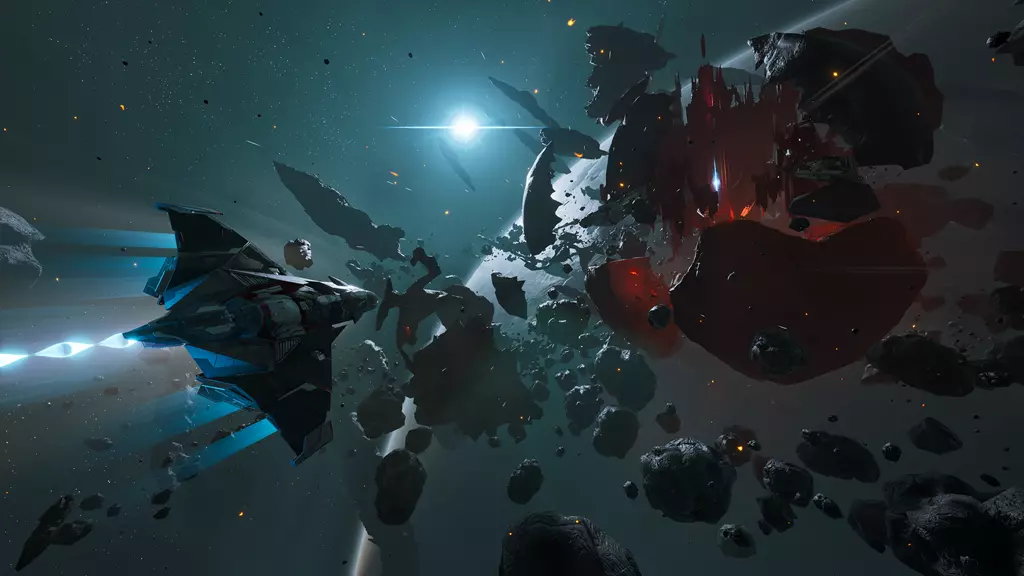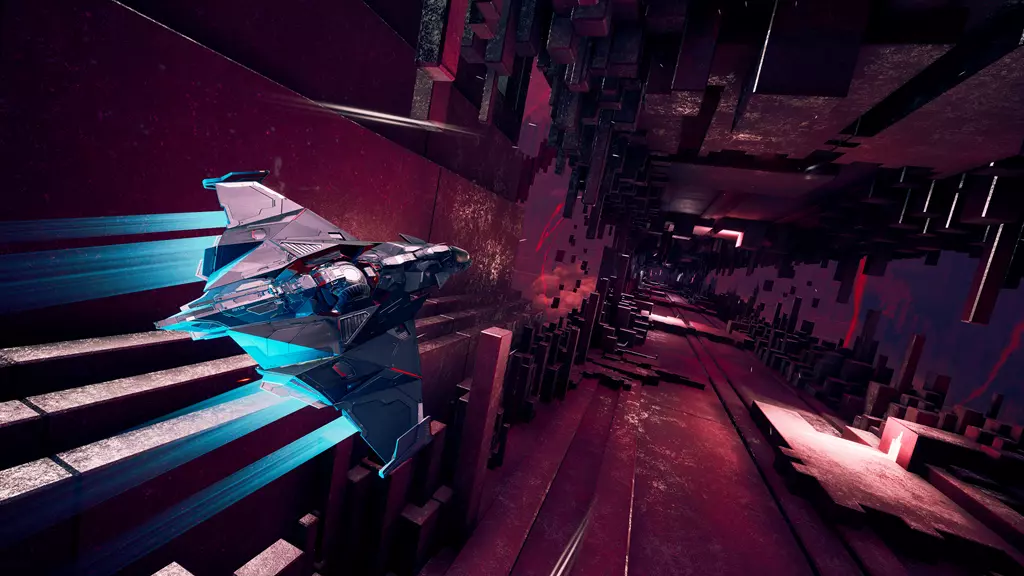I grew up on a genre that has been slowly dying out over the decades: space combat games. I’m talking about Wing Commander, Freelancer, Starlancer, Star Wars: X-wing vs. TIE Fighter. At one point, these were the only games I played, and for good reasons. Yet over the years, there have been fewer of these types of games, which made me sad. Thankfully, 2021 saw several space combat games either being announced or released, with Chorus being one of those I’ve been interested in. Developed by Fishlabs, known for the Galaxy on Fire games before Deep Silver snatched them up. Chorus has been a joy to play, and while it hasn’t been a completely smooth ride, it’s a worthwhile one.
Game Name: Chorus
Platform(s): Xbox Series X|S (Reviewed) PS4, PS5, Xbox One, PC, Google Stadia
Publisher(s): DeepSilver
Developer(s): DeepSilver Fishlabs
Release Date: December 3, 2021
Price: $39.99
I have to get this out of the way; if you were a fan of Fishlabs prior games, Galaxy on Fire, then you’re going to love Chorus. There are bits and pieces of those games’ DNA in Chorus. It’s a dream come true for Fishlabs, who never worked on a console or PC version of Galaxy on Fire. I dabbled on those games, but I didn’t play them for long as they were mobile games. However, with Chorus, I couldn’t put my controller down.
In Chorus, you play the role of Nara, a pilot who defected from a maniacal group of individuals who only want to force their beliefs on the entire universe, called the Circle. They’re not too fond of anyone who disagrees with them and rewards those with destruction and death. Nara did some nasty stuff when she was with the Circle, but something snapped inside her; she left and went into hiding. Assuming the life of a soldier, Nara releases that it’s only a matter of time before the Circle ends up reaching the area of the universe that she fled. Once a few events are set into action, Nara is reluctantly drawn into a conflict that only she can turn the tides. Well, with the help of her combat-hungry ship that she locked away. It’s important to note that Nara isn’t the average pilot. She commands supernatural power called “Rites.” These rites give her an advantage over her enemies, and they’re helpful when trying to locate items floating around in space and for completing objectives.
This entire story that plays out feels like one that doesn’t seem like it would work in a space combat game. Except it does, and there’s plenty of moments that kept me vested in the story. Nara isn’t the perfect protagonist, as she’s broken, and her ship, Forsa, also has its own issues. However, it’s the mending of their relationship and what they mean to not only each other but the universe. While Chorus has the main story, there are many side quests that are worth getting involved with, mainly because these side quests will reward you with credits, weapons, and other items and a chance to see other NPCs that you usually wouldn’t encounter. Not only that, but the world of Chorus is an interesting one. Deep Silver Fishlabs could have focused on the main game and left it at that. Instead, they’ve crafted a world that rewards those looking for something other to do. The sights of Chorus are majestic, and just flying around massive asteroids, decommissioned stations, and other things floating around space had me wondering where else was there out there to encounter.
When it comes to a number of space combat games, there’s usually some complex system that includes having a wide assortment of weapons and supplements that add to the defensive capabilities of the ship. While that’s nice and all, it does ruin the fun as I don’t always want to min/max when I want to just blow things up. So I appreciate the simplified systems in Chorus. While still packing enough heat to make any space combat fan smile, the game breaks it down to just three weapons; Gatling Guns, Lasers, and Missiles. Now, these systems can be upgraded by purchasing newer variations or being rewarded by completing missions, or by becoming more familiar with those weapons. That last bit is a clever method of making sure pilots don’t get too comfortable and rely on just one weapon.
Chorvus rewards pilots by completing achievements such as destroying a number of enemies up with a different weapon or performing various feats. By doing so, you’ll level up your weapons and reap the rewards such as faster fire rates or a bump in damage percentage. If the more you use different weapons during your quest, the better you become at being an unstoppable machine. While all of the weapons will damage enemy ships, the game uses a rock/paper/scissor system. Your Gatling Guns deal physical damage and chew up ships real good, while your Laser does a better job at taking down the shields. Missiles are in a weird place, to be honest. They cannot lock on to enemies and are only good at close-up encounters and straight lines. Sure, you can play however you like, but using the right tool and the right time will make things better in the long run.
Nara doesn’t just have physical means of attack at her disposal, as she can also utilize her rites and use them in some devastating ways. While starting out, they aren’t useful in dog fights, but they become super useful when doing combat once you start picking up additional ones. Perhaps a bit overpowered, I’d say. There were two that I used exclusively, and they shredded the enemy when used.
Weapons are nice, but if you can’t withstand a few hits, then you’re just a glass cannon. Thankfully, you’re able to also add to your ship but purchasing armors and items that will boost your thrusters, add to your deflector shields, and more. What’s nice about this system is that once you own these upgrades, you can swap them out at any time — you’re not restricted to doing so at a hanger once you’ve acquired them ahead of time, that is. I found myself in several situations where swapping out these pieces made was the key factor in failure or success.
Chorus is tough; there’s no getting around that. You will be restarting after being blown to cosmic dust or smacking into something and exploding. The enemies, even on the medium setting, can be enough to give you a workout. They just don’t come at you in small groups, and as you progress through the game, the variety of enemies evolve. I loved that the enemies always evolved as I progressed, but at times they did seem a bit overwhelming. The challenge was always there, and I loved every bit of it, but damn, sometimes I wished the game took it easy on me. Other times I was like, “Is that all you got?” Chorus is not an easy game, and you will die a lot, but damn if it wasn’t fun. If you don’t think that’s tough enough, there’s also a perma-death setting that I dared not touch.
My time with Chorus was with the Xbox Series X, and surprisingly it wasn’t that bad. Don’t get me wrong, but I usually play these games on the PC. So taking the helming on consoles was an eye-opener. While there are two settings, Performance and Graphics, I spent most of the game on performance mode. I didn’t see a big difference when using graphics mode, and I prefer higher frame rates versus things looking pretty if I have to choose between the two. It’s worth mentioning that even with the performance mode, I noticed a few stutters here and there. Nothing game breaking and I’m sure that will be addressed. The game also features an assortment of options to tweak the control, including dead zones. I only wished I had access to a HOTAS to play the game properly.
The audio is top-notch as well. The audio direction is fantastic, from the sounds of the weapons, the chatter from the various people you’ll interact with. Also, when enemies meet their end, you’ll hear them over the chatter cursing you or other random things such as “You’ll get yours” or “ARGH” or even ” Hail the prophet.” It’s the small touches that add to the immersion.
While I enjoyed my time with Chorus, and the game has definitely entertained my thirst for a competent space combat game, it wasn’t all good. I encountered a number of glitches that happened at the wrong moments, which was frustrating. At key points of the game, after I’ve spent 10 minutes or more wrapping up a mission and moving to the next, the game would glitch out. Leaving me stuck in space, with no control over Forsa. Unfortunately, restarting at the last mission checkpoint didn’t correct the issue. Restarting my Xbox was the only way to fix the problem, but they also meant I had to restart the mission. And had I not manually saved, I was forced to replay the entire mission; it didn’t matter if I was on the last leg of it or the beginning. I also experienced a number of crashes, where the game would just blackout and booted me back to the Xbox home screen. This also happened at the worst times. I did pass these issues along and confirmed that fixes were already on the way. Hopefully, you won’t experience these issues when the game goes retail.
So far, so good, and Chorus checks all the boxes, with the exception of accessibility. There’s are barely any options short of enabling/disabling subtitles, changing subtitle sizes, playing with target markets. And oddly enough, enabling/disabling post-process features such as chromatic aberration — keep that nonsense off. You’d figure in this day and age that more developers would include better accessibility options for thier games. If there’s one negative mark for Chorus, it’s this.
Verdict
Chorus is one of the better space combat games I’ve played in a long time. There’s plenty of space combat to be had, while the story is decent enough to keep you wondering what’s going to happen next. The game also looks impressive, no matter what visual setting you use, and the controls are great. If anyone is looking for thier first space combat title and doesn’t want some to play something that’s not overly complicated, then Chorus is the game I’d recommend.
Review Disclosure Statement: Chorus was provided to us for review purposes. For more information on how we review video games and other media/technology, please review our Review Guideline/Scoring Policy for more info.
Affiliate Link Disclosure: One or more of the links above contain affiliate links, which means at no additional cost to you, we may receive a commission should you click through and purchase the item.
Summary
Chorus is a fantastic return to space combat games and one I’m sure that both newcomers and veterans will enjoy.





